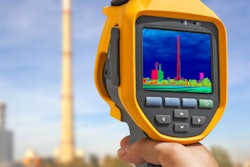
Radiology has a role to play in mitigating the negative effects of climate change and the resulting environmental degradation, according to a commentary published July 18 in the Journal of the American College of Radiology.
The key is a shift to a "planetary health" paradigm, wrote Dr. Julia Schoen of Wake Forest School of Medicine in Winston-Salem, NC, and Dr. John Scheel, PhD, of Vanderbilt University Medical Center in Nashville, TN. Schoen is co-chair and Scheel is vice chair of the American College of Radiology's (ACR) task force on sustainability and climate.
The U.S. healthcare system is under duress; radiology contributes to this through increased case complexity and volumes, Schoen and Scheel noted -- problems further exacerbated by social inequity in healthcare and supply chain shortages, which are themselves aggravated by environmental degradation. Some Fortune 500 companies have established sustainability initiatives, the pair noted, but healthcare has much work to do to expand awareness of the need for these types of protocols; in fact, each year healthcare contributes 8.5% of carbon emissions and solid waste in the U.S., and radiology is a major contributor.
But a new paradigm, "planetary health," is developing, according to Schoen and Scheel.
"Planetary health is an emerging field that seeks to understand the dependence of human health on our environment," they wrote. "It also looks for ways to adapt to ecosystem changes and degradation from human impact."
One effect of climate change is disruption to radiology services due to acute weather events, which can affect electricity, air conditioning, and IT service capacity, Schoen and Scheel wrote. Extreme weather can increase patient trauma and access to ongoing care such as chemotherapy or dialysis -- not to mention social unrest, especially among those already more vulnerable to pollution, the effects of climate change, and disease.
How can radiology be part of the solution rather than the problem? Schoen and Scheel offered the following suggestions:
- Support sustainability initiatives in low- and middle-income countries through partnership with local professional radiology societies. "This exchange should be bidirectional, as radiologists in [these countries] can teach us how to recognize diseases that are common in the global South and are increasing in the U.S.," the authors wrote.
- Decrease costs by turning off idle equipment and switching to reusable or multiuse devices. "At current US energy prices, powering down CT scanners after hours can save departments approximately $2,240 per scanner annually," they noted.
- Focus on sustainability through mitigating risks such as access to energy, labor shortages, and supply chain disruptions. "The medical industry is based on a linear ... economy, which emphasizes planned obsolescence and single-use devices," the authors wrote. "This is both financially costly and detrimental to the environment. [Instead, we can develop a circular economy that] minimizes resource extraction and maximizes the life span of devices."
The "planetary health" concept offers radiologists and their physician peers a broader perspective, according to Schoen and Scheel.
"Radiologists can use our central position in healthcare to lead sustainability efforts, disseminate information to other disciplines, and solicit buy-in for high impact reform," they concluded. "We can start by addressing our own environmental impacts and drawing on sustainability initiatives in other specialties."
The complete commentary can be found here.




















